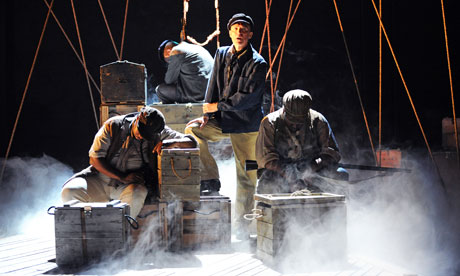
An opera adaptation of Joseph Conrad's Heart of Darkness? Amazingly, it's never been done before. But 33-year-old composer Tarik O'Regan's new chamber opera, the first stage work from this brilliant British composer, was inspired by the most famous adaptation of Conrad's remarkable novella. "I had always loved Coppola's film Apocalypse Now, and in 2001 realised the movie's relationship with the book," he says in a pub over the road from the Royal Opera House, where the work will be staged. A year later, in conversation with his friend and librettist, the artist, composer, and writer Tom Phillips, O'Regan's opera was born.
It's been a nearly decade-long journey from that initial spark of inspiration to the staging of Heart of Darkness at the Linbury Studio theatre at Covent Garden this week. "We knew from the start that the opera should be short and small," he says. It plays for about 75 minutes, and O'Regan uses an ensemble of 14 players. But the emotional and dramatic effect of the piece should be anything but small-scale, mirroring the disproportionate power of Conrad's slender book.
The book has an archetypal resonance as a piece of matchless storytelling. On a boat on the Thames, Marlow relates the drama of his journey to encounter the mysterious Kurtz in the geographical Heart of Darkness, up-river in the uncharted wilderness of central Africa. The story is a still-controversial meditation on the dangers and excitements of colonial power, with the novella either adopted as a visionary anti-empire narrative, or a racist diatribe that silences the voice of the natives.
"What was most interesting for me was the nature of storytelling," O'Regan says. "The most important thing in the book and the libretto is that we see the lie that Marlow tells." Charged with delivering the dead Kurtz's effects to his fiancee, Marlow tells her that Kurtz's last words were her name; in fact, they were: "The horror, the horror."
"One of my favourite lines in the book is when Marlow says, 'It seemed to me as if I was also buried in a vast grave full of unspeakable secrets,'" says O'Regan. "And that's the drama of all this, that he is finally able to say, 'I saw all of this', and the real tragedy is that he also kept it a secret. And it's in that gap between the truth and the narrative of the truth where our piece of drama can fit. That's what music can do; it can amplify the ambiguity of the story."
O'Regan could have gone for a crude musical characterisation of Conrad's tale, making the most of the difference between the Thames and the Congo; between the colonial Europeans and the Africans. But his musical solution is much more subtle. "The only bit of ethnographic research I did was to find the earliest recordings I could of Congolese music. And the influence of that music is heard most in the scenes on the Thames. That's because whenever Marlow talks about Africa, it's as if he is really there, and he sees his experience in the faces of everyone he's telling the story to."
That dramatic blurring of boundaries continues in the casting of the opera. The eight singers have to take on different roles of different races. "There's only one female singer in the piece, Gwenneth-Ann Jeffers, who plays the two loves of Kurtz, the River Woman and his white Belgian fiancee, and once we'd made that decision, we were able to cast race-blind." So the Manager is sung by Sipho Fubesi, a black South African taking a part that you imagine as a jobsworth white colonial when you read the novel. "But then, the terrible aspect of postcolonial experience was what happened when the white colonial rule was removed and the new black leaders took over the worst sides of colonial power," says O'Regan.
The cast is truly multiracial and multinational, with singers of Korean as well as South African heritage, plus the Danish bass, Morten Lassenius Kramp, who sings Kurtz, and two Brits: tenor Alan Oke and baritone Donald Maxwell. "It's mysterious in the novel: what is the time gap between what Marlow went through and when he is telling the story? It could be 20 or 30 years – or he might be telling the story now. England today is made up of all these races, so all these people on stage are the faces on the Thames as they're listening to this story."
There is an enigma at the centre of Heart of Darkness. Kurtz is horrifying because he is such a magnetic, charismatic presence, in the same way that Marlow is both disgusted and attracted by the colonial enterprise. "There's no clean version of the story," O'Regan says. "Just like Marlow, Conrad himself bought into the colonial dream. He too had a passion for maps, to fill out the blank spaces on the charts. Conrad goes out there to Africa and he sees the abhorrent nature of its reality, but it's not until much later he writes the novel. He couldn't tell the truth until he wrote the book, in other words. It's the same with the younger Marlow: until he tells his story, he's part of it, too. It's that preservation of secrecy that the younger Marlow, and the younger Conrad, are guilty of." It's in that secret that the dark heart of O'Regan's opera lies.

